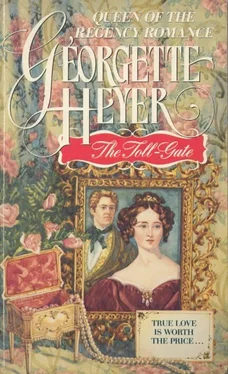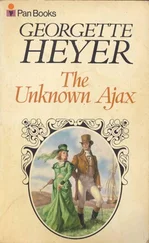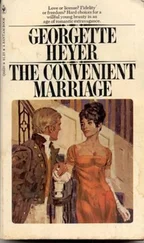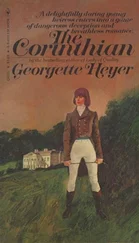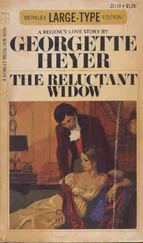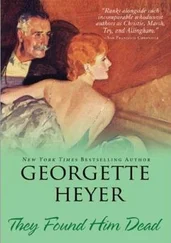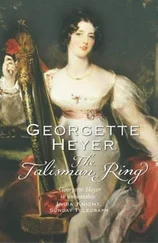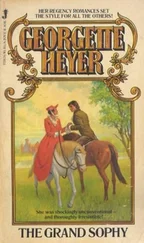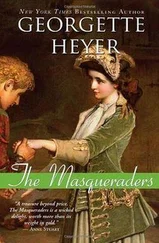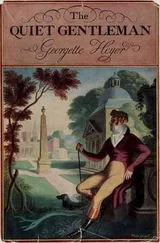“No, you might not find me there. Besides, I shan’t need you.”
“Well, sir, that’s as maybe, but what I should like to know is who’s going to clean them leathers?” demanded his henchman.
“I don’t know. Mr. Babbacombe’s man, I daresay.”
“Ho!” said Cocking. “That’ll put Mr. Babbacombe’s man in prime twig, that will! Howsoever, it’s just as you wish, sir, out of course!”
He then watched his master ride off down the avenue, slowly shaking his head. A sparrow, hopping about within a few yards of him, was the recipient of his next cryptic confidence. “Resty, very resty!” he said, staring very hard at the bird. “If you was to ask me, I should say we shall have him up to some kind of bobbery in just a brace o’ snaps!”
The Captain, although he had not the smallest intention of getting up to bobbery, was heartily glad to escape from Easterby. There was nothing but Lord Melksham’s mild excesses to break the tedium; and he did not find these amusing. His cousin’s life was hedged about by all the proprieties which had driven the Captain, eight years earlier, to persuade his father to buy him a pair of colours. He had had a strong notion that the Army in time of war would suit him, and events had proved him to be right. Life in the Peninsula had been uncertain, uncomfortable, and often haphazard, but it had offered almost every kind of adventure, and John had refused none of these. He had enjoyed himself enormously, and never so intensely as when engaged upon some dangerous enterprise.
But when the war ended, in 1814, although he rejoiced as much as any man in the downfall of Bonaparte, he knew that the life he liked had ended too. Not for John Staple, the boredom of military life in peace-time! He yielded at last to his mother’s solicitations, and sold out. She thought that he would find plenty to occupy him in the management of his estate, his father having died a year previously. The elder John Staple had been an indolent man, and for some months his son was busy enough. Then had come the news of Bonaparte’s escape from Elba, and a brief period of exciting activity for John. But Bonaparte had been a prisoner on St. Helena for two years now, and everyone seemed to feel that it was time John settled down to a life of civilian respectability. He felt it himself, and tried to be content, but every now and then a fit of restlessness would seize him. When that happened his subsequent actions would be unpredictable, though, as his brother-in-law gloomily said, it was safe to assume that they would be freakish, and possibly outrageous. Lord Lichfield had every reason to believe that he had once wandered for a couple of weeks with a party of gypsies; and not readily would he forget John’s sudden arrival at his house in Lincolnshire, at midnight, by way of an open window, and clad in strange and disreputable garments.
“Good God, what have you been doing?” he had exclaimed.
“Free trading!” had replied John, grinning at him. “I’m glad I’ve found you at home: I want a bath, and some clean clothes.”
Lord Lichfield had been too much shocked to do more than goggle at him for a full minute. It wasn’t, of course, as bad as John made it sound: the whole affair had been the result of an accident.
“But what I say is this, Fanny!” had complained his lordship later. “If I go sailing, and run into a squall, and have to swim for it, do I get picked up by a smuggling-vessel? Of course I don’t! No one but John would be! What’s more, no one but John would finish the voyage with a set of cut-throat rascals, or help them to land their kegs! And if it had happened to me, I shouldn’t be alive to tell the tale: they’d have knocked me on the head, and dropped me overboard.”
“I cannot conceive how it comes about that he was spared.’” Fanny had said. “Oh, I wish he would not do such things!”
“Yes,” agreed her lord. “Though, mind you, he’s very well able to take care of himself.”
“But in the power of a whole crew of smugglers!”
“I expect they liked him.”
“Liked him?”
“Well, you can’t help liking him!” pointed out his lordship. “He’s a very charming fellow—and I wish to God he’d settle down, and stop kicking up these larks!”
“Mama is right!” declared Fanny. “We must find him an eligible wife!”
Candidate after candidate for this post did Fanny and her mama find, and cunningly throw in John’s way. Apparently he liked them—all of them. This one was a most conversible girl, that one seemed to him a very lively girl, another a remarkably pretty girl. But he asked none of them to marry him. When his sister ventured to ask him once if he had ever been in love, he had replied quite seriously, Yes: he rather thought he had been desperately in love with the lodgekeeper’s wife, who used to regale him with brandy-snaps, and allowed him to keep in a hutch outside her kitchen-door the ferrets Mama had so much disliked.
Was that all? had demanded an exasperated sister. No, there had been a girl in Lisbon, when he first joined. Juanita, or was it Conchita? He couldn’t remember, but at all events she was the loveliest creature you ever saw. Dark, of course, and with the biggest eyes, and such a well-turned ankle! Had he been in love with her? “Lord, yes!” replied John. “We all were!”
He admitted that it was time he was thinking of getting married: not, of course, to Fanny, but to Mama. “Well, I know, Mama,” he said apologetically. “But the thing is I’ve got no fancy for one of these dashed suitable marriages, where you don’t really care a fig for the girl, or she for you. I don’t mean to offer marriage to any girl who don’t give me a leveller. So I daresay I shall remain a bachelor, for they don’t—any of ’em! And if one did,” he added thoughtfully, “it’s Lombard Street to a China orange you wouldn’t take to her!”
“Dearest boy, I should take to any girl whom you loved!” declared Mrs. Staple.
He grinned his appreciation of this mendacity, and gave her shoulders a hug, saying: “That was a whisker!”
She boxed his ears. “Odious boy! The fact of the matter is that it is a thousand pities we are not living in archaic times. What you would have liked, my son, is to have rescued some female from a dragon, or an ogre!”
“Famous good sport to have had a turn-up with a dragon,” he agreed. “As long as you didn’t find yourself with the girl left on your hands afterwards, which I’ve a strong notion those fellows did.”
“Such girls,” his mother reminded him, “were always very beautiful.”
“To be sure they were! Dead bores to, depend upon it! In fact, I shouldn’t be at all surprised if the dragons were very glad to be rid of ’em,” said John.
Not very promising, this. But Fanny had discovered Elizabeth Kelfield, and Mrs. Staple had acknowledged, after careful and critical study of Miss Kelfield, that here was a lady who might well take John’s fancy. She was dark; she was decidedly handsome; her fortune was respectable; and although she was not quite twenty years of age she seemed older, the circumstance of her having taken from an invalid mother’s shoulders the burden of household cares having given her an assurance beyond her years. Mrs. Staple thought she had quality, and began to cultivate the ailing Mrs. Kelfield.
And now, when mother and daughter had been coaxed to Mildenhurst, off went John into Leicestershire, so that all the scheming so painstakingly undertaken on his behalf seemed likely to be wasted.
In happy ignorance of this, Captain Staple, climbing the slopes of the Pennines, found himself in a wild, moorland country, and liked it. Having a good sense of direction, he had left the pike road at the earliest opportunity, and with it, in a very short space of time, all signs of civilization. This exactly suited his mood, and he rode over the moors, at an easy pace and in a south-easterly direction. He had meant originally to have spent the night in Derby, but his late start made this impossible. Chesterfield became his objective. That was before the bay cast a shoe. When this happened, the Captain had ample time in which to regret having left the pike road, for he appeared to be in the centre of a vast desert. The only habitations to be seen for miles were an occasional cottage, and a few rough sheds dotted about the moors for the protection of shepherds.
Читать дальше
